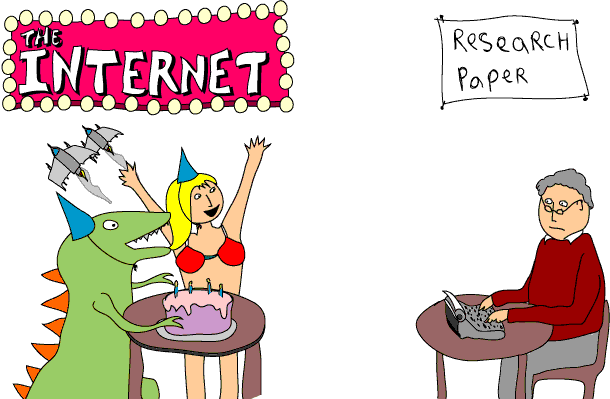Picture this: you're sitting at your desk, face mashed into your palm, and you're browsing Reddit (or Tumblr, or Facebook). You have things to do (more than you want to think about), but somehow you keep convincing yourself that five more minutes of Internet will be fine. And, as you get ready to go to bed, you find that you've achieved nothing today. This seems to happen more days than not.
Sound familiar?
Some people don't have that problem. Some people seem to set goals, and work tirelessly towards them, putting in crazy hours and ignoring everything else to get what they want, without being tempted by a beige monotony of cat pictures and Internet memes (it's not just the Internet, either -- I know people who procrastinate by literally staring at a featureless wall).
What makes those productive people different? As it turns out, there's plenty of research on the subject, and the answer turns out to be pretty simple.
Here's a hint: It's not that they're fundamentally better people than you are.
Willpower is, roughly speaking, the ability for your executive function (the part of your mind that thinks about the future, makes plans, and has explicit goals) to shout down the animal hindbrain, which mostly cares about comfort in the moment. Your animal hindbrain likes sex, food, gossip, and cat pictures. It doesn't care about the future, which is when you'll be suffering from your procrastination today.
There's a balance between the two, and that balance is where "willpower" lies. You can see the early signs of it in kids if you give them the now-famous marshmallow test.
As it turns out, "willpower" can be increased in a number of simple, straightforward ways. For example...
Treat it Like a Skill
Part of the problem is that people assume that willpower is a fixed and unchangeable part of their moral character. Then, when they need to push themselves to do something, they feel like it should work because they know that they're a good person --- and then they feel helpless when they fail. In reality, willpower is a skill that you can (and need to) practice.
Imagine the same kind of thinking applied to another skill, like music. Imagine if people thought that their musical ability was a question of moral character, and that their failure to play Bach on demand was a sign that they just needed to grit their teeth and try harder. Imagine the lines of people around the block, waiting to get in to talk to a music guru who says they can teach them how to try harder.
In reality, of course, the issue isn't that they aren't trying hard enough -- it's that they've never taken a music lesson in their lives!
The same is true of willpower. Realistically, delayed gratification is probably something we should teach kids in elementary school, but, if you've made it this far, you're probably on your own. So, how can you build that neglected mental muscle? How can you practice willpower?
Set Achievable Goals
If you set out to learn any skill for the first time, where do you start? At the beginning. The easiest lesson. The lightest weight. Scale back your goals until you're setting ones that you can consistently achieve. Don't say "I'm going to write five thousand words of my novel today" if you've literally never achieved that before -- you're only practicing failure and demoralizing yourself.
Say, "I'm going to write one page of my novel today" or even "I'm going to write two paragraphs of my novel today." Get it down low enough that it doesn't sound too scary to even start. And, when you've got a few weeks in of regularly sitting down and actually doing something, then you can start increasing the weight limit: bump it up to two pages, and see how it goes. Over time, as you practice succeeding, doing more will get easier and easier.
You can use a to-do list app to make the whole process a little more formal and specific, and specifically practice clearing your to-do list before you go to bed. There are also a variety of apps to help you focus and keep track of progress.
Focus On One Thing at a Time
Sometimes, there's a bunch things you need to do, and that's overwhelming in itself. If there are a dozen things that need to be urgently done, and doing any one of them means neglecting all the others, it can be so painful to think about that you just end up ignoring them all and looking at cat pictures instead of doing any of them.
To avoid this, do some triage: After you make your initial to-do list, read through it and get rid of all the ones that won't ruin your life if you ignore them. Of the rest, set a hierarchy. Make it clear what's next on your list of priorities, and what a manageable next step is on that. Don't think about anything except that next step. Keep success and failure defined entirely in terms of things you can do today -- Now! Try not to get caught up in the big picture.
Don't Deplete Your Reserves On Things That Don't Matter
Willpower, like muscle power, is not an unlimited resource. You get tired. As you use it, it gets harder to deploy it in the future -- this is a heavily replicated result in experimental psychology.
That means that an easy way to be more productive at the tasks you actually care about is to try to eliminate willpower expenditure in the areas you don't care about. If you're struggling every morning to get out of bed, you're burning a lot of mental fortitude before you ever even get to your to-do list. See what you can throw under the bus to buy yourself some extra stamina.
Go to sleep earlier, eliminate sources of stress and anxiety, buy a Roomba instead of vacuuming. Buy paper dishes so you don't have to wash them as often. Try to be healthier: sneak some light cardio in every day (which has clear mood-boosting benefits). Don't make lack of time an excuse -- anyone can fit in a 7-minute workout and there are ways to stay fit at your desk too. See where you can remove big but unimportant demands on your executive function and make yourself happier.
In particular, sleep seems to have a major impact, so try to use some simple interventions to improve the quality of your sleep: use a white noise app to tune out distractions, and cover annoying blinking LEDs. Try to make waking up painless as well: get a good alarm clock app, or even make your own.
Do Hard Things Earlier
Secondary to this, plan your unpleasant tasks around how good you feel and how much mental stamina you have left. That means getting hard tasks out of the way early in the day: get up, drink a cup of coffee and do some jumping jacks to try to clear away mental fog, and then sit down and work until you're done with the hardest thing on your list. It'll be easier than you think.
If you can get all of your work for the day done by 2:00, it's an amazingly good feeling, and it leaves you able to do something fun or focus on secondary tasks for the rest of the day. Work done in the morning, when you have a full reserve of stamina, goes faster and is of higher quality than work wrung out of a tired brain at the eleventh hour at the end of the day, when you're already burned out and just want to go to bed.
Be Willing to Make The Effort
Willpower isn't magical. It's a mechanical, neurological function, and it's one you can improve in some simple and effective ways. You do, however, have to be willing to actually do those things with the willpower you have now, just like you have to be willing to endure some pain and discomfort in order to exercise. It will be a little bit unpleasant You need to pony up the energy investment to push yourself, just a little, every day. You can't make progress by living entirely within your comfort zone.
You may, however, not have to go very far outside it to start the ball rolling on accelerating improvements. It only takes a few small changes to make a measurable impact on the kind of person you are. After a few months of hard work, you might be surprised at how easy it is to ignore the siren call of cat pictures and do things that actually matter -- and, by making those small changes, you might find yourself, in a few decades, looking back on a very different life.
Nobody wants to get to their death bed and look back at eighty years of wasted time and missed opportunities.
Image Credits: sitting male Via Shutterstock, "P1400212 Hirn Un Ei", by Thorsten Krienke, "DSC01869", by Erna Pauber, "distractions" [Broken Link Removed], by Conor




